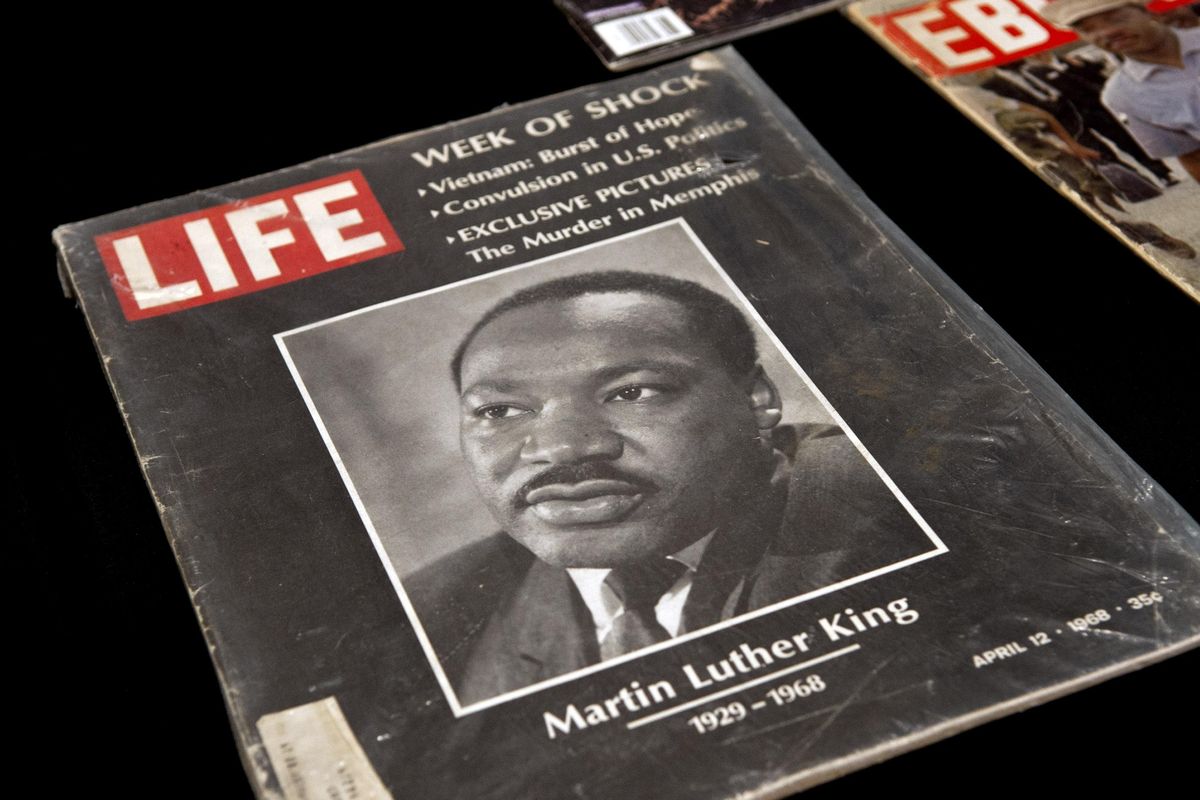Traveling museum brings African-American history to Whitworth University

A college sociology class and the Million Man March in 1995 inspired Khalid el-Hakim to launch the Black History 101 Mobile Museum, a traveling exhibit that pulls from more than 7,000 items of African-American history.
The mobile museum’s collection of items from the civil rights movement, music, sports and pop culture has visited more than 32 states as well as 300 schools, libraries, cultural events, conferences and religious institutions throughout the nation.
Whitworth University on Tuesday hosted the traveling museum, which features 200 pieces of memorabilia displayed chronologically, from the trans-Atlantic slave trade era to current hip-hop culture.
The collection includes an old drinking fountain sign; newspapers; vintage magazines featuring Muhammad Ali, Malcolm X and Michael Jackson; a signed album from the late comedian Dick Gregory; and a signed letter from Barbara Jordan,who in 1972 became the first African-American woman from the South to be elected to Congress.

El-Hakim, known as the “Schomburg of the hip-hop generation,” began his collection after taking a sociology class in 1991. The class was led by professor David Pilgrim at Ferris State University in Michigan, who brought in original items from the Jim Crow era to teach students about topics such as racism.
Four years later, el-Hakim attended the Million Man March in Washington, D.C., where minister Louis Farrakhan asked attendees to take a pledge to be responsible and active in improving their communities.
El-Hakim, a social studies teacher in Detroit at the time, accepted the pledge and created the mobile museum.
El-Hakim, who also was a manager and booking agent in the entertainment industry, collected some pieces for the museum from flea markets, garage sales, auctions and estate sales while on tour with artists.
He organized the mobile museum into “tabletop” themes: women, hip-hop, Jim Crow, civil rights/Black Power, science/technology, music and sports.
The Rev. Rick Matters, a member of the Spokane Committee Against Racism’s steering committee and an Episcopal priest in the Diocese of Spokane, visited the museum Tuesday morning.
“It’s enriching because there’s a lot of cultural beauty on display here,” he said while perusing the exhibit.
Matters found the Frederick Douglass and Malcolm X exhibits interesting, stating the importance of the mobile museum is to raise awareness about racial equity issues, which he spends a lot of time working on.
“Displays like this help bring to the surface what’s right in front of our eyes, but we may be blind to,” he said.
People exhibit a wide range of emotions while viewing the artifacts, said Richard Griffin, assistant curator of the museum and co-founding member of the hip-hop group Public Enemy.
“It moves people,” he said, adding that the museum’s pieces often lead to discussions. “I always tell people there’s nothing wrong with having a dialogue. A beautiful thing is to have a dialogue about it, so we don’t repeat some of that stuff.”
Griffin, who goes by Professor Griff, said the museum is intended to bring history to people, especially younger generations who may opt out of visiting brick-and-mortar museums.
The mobile museum launched its 2019 tour at Reed College in Portland and will stop in more than 40 cities before ending in July at the Capital Area District Library in Lansing, Michigan.
Whitworth hosted the museum two years ago for Martin Luther King Jr. Day. The exhibit made an impact on students, said Lorna Hernandez Jarvis, Whitworth’s chief diversity officer and associate vice president of diversity equity and inclusion.
“We just got such a positive response from the community and students seeing this amazing collection of artifacts,” she said. “Some of them talked about not knowing the history and how eye-opening it was.”